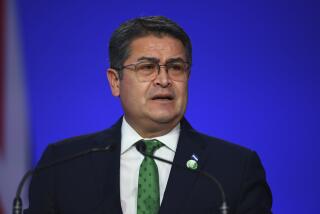Indictment of Noriega Called ‘Long Overdue’
- Share via
WASHINGTON — Gen. Manuel A. Noriega, the Panamanian military ruler, long has been deeply involved in international crime and could have been indicted years ago if the U.S. government had been willing to move against him, current and former U.S. officials told a Senate panel Monday.
“People in law enforcement have known Gen. Noriega was corrupt for a long period of time,” said New York City Dist. Atty. Robert Morgenthau, who termed last week’s indictment “long overdue.” He said the Panamanian leader had been sheltered by “high people in the U.S. government” who used him to gather intelligence.
Retired Army Gen. Paul F. Gorman, former commander of the U.S. Southern Command based in Panama, said that drug traffic from Central America was so widespread during his tenure from 1983 to 1985 that he took the issue to the Joint Chiefs of Staff but “couldn’t get their attention.”
The testimony came before the Senate Foreign Relations subcommittee on terrorism and narcotics as the panel opened hearings on the effect of narcotics trafficking on U.S. foreign policy. Noriega was indicted in Florida on Friday along with 16 associates on charges of drug smuggling, racketeering and money laundering.
Gorman portrayed Noriega as a “venal” leader who “was involved in a lot of very, very shady kinds of undertakings.” The retired general, who commanded 10,000 U.S. troops in Panama, said that Noriega had “significant power to harass, to intimidate and to make life difficult for the men and women of my command. I would not do anything to irritate him, lest he indulge in one of his picayune acts of retribution of which we knew him to be fully capable.”
The general recalled that Noriega’s Panama Defense Forces “laid down the rules” that U.S. forces had to follow in the nation, including those governing military uniforms. For example, he said, an American soldier wearing his uniform in downtown Panama City was subject to arrest.
The indictments against Noriega, which allege that he took payoffs of more than $4.6 million to protect cocaine shipments from Colombia through Panama to the United States, illustrate a “travesty” in the inability of the United States to manage its foreign policy, said Gorman, who referred to Noriega as a “pimple on the rump of an elephant.”
In other testimony Monday, a discharged Eastern Airlines pilot who is now a lobbyist from Salinas, Calif., testified that the airline was aware that drugs were being smuggled on its flights between Latin America and the United States from 1981 to 1986 but did nothing about it. Gerald Loeb said he was fired by the airline April 21, 1986, for “outrageous conduct” in submitting a report on the flights to the FBI.
Karen Ceremsak, spokeswoman for Eastern in Miami, said that Loeb’s “charges are totally outrageous and without any basis whatsoever.” She said that Eastern has implemented an “elaborate and expensive drug interdiction program.” Eastern, which was purchased by Texas Air Corp. in 1986, was fined $1.3 million that year for negligence after federal agents seized 1,800 pounds of cocaine from two planes.
As the subcommittee focused on international drug operations, the White House discounted a series of foreign policy-related charges aired by Noriega since his indictment. They included a claim that the United States had asked Panama to cooperate in a plan to invade Nicaragua.
White House spokesman Marlin Fitzwater said: “As the President has said many times, we’ve never had any intent of invading Central America. That was our policy then, and that’s our policy now.
“Remember, Noriega offered this as a defense for his drug indictment, and so I wouldn’t give it much credence,” he said.
More to Read
Sign up for Essential California
The most important California stories and recommendations in your inbox every morning.
You may occasionally receive promotional content from the Los Angeles Times.













